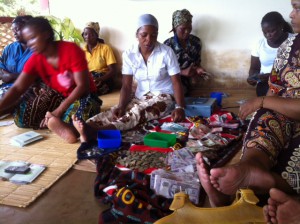 I have spent a big part of my career on Africa. Either working in the DRC for three years financing microentrepreneurs and small businesses, or working as a consultant on mobile banking agent networks in Tanzania, DRC, Madagascar, and Senegal. I was many times disappointed by how many African countries “shoot themselves in the foot around five times a day” (many people who know me will have heard this expression many times when discussing Africa with me).The Economist’s latest article on Africa “Making Africa work” offers quite a few very positive messages which show that our work in development in worthwhile. I had not been questioning it, but in the last months it was sometimes difficult to motivate myself since I felt like Sisyphus rolling a stone of access to finance up the hill, only to see it roll down right afterwards.
I have spent a big part of my career on Africa. Either working in the DRC for three years financing microentrepreneurs and small businesses, or working as a consultant on mobile banking agent networks in Tanzania, DRC, Madagascar, and Senegal. I was many times disappointed by how many African countries “shoot themselves in the foot around five times a day” (many people who know me will have heard this expression many times when discussing Africa with me).The Economist’s latest article on Africa “Making Africa work” offers quite a few very positive messages which show that our work in development in worthwhile. I had not been questioning it, but in the last months it was sometimes difficult to motivate myself since I felt like Sisyphus rolling a stone of access to finance up the hill, only to see it roll down right afterwards.
Here the good messages from the Economist article:
- As recently as 2012 Zambia paid less than Spain to borrow dollars.
- The proportion of Africans living in absolute poverty has fallen from 58% to 41% since 2000.
- Private equity funds dedicated to Africa raised record sums to invest in shopping malls and firms making everything from nappies to fruit juice.
Sound economic policies, controlling of government budgets, and managing inflation prevail. However, there are still a few countries messing up, e.g., in DRC where Joseph Kabila’s cling to power risk restarting a civil war, just as it happened in Burundi. Nigeria is trying to stabilize its overvalued currency, but by banning imports it is driving up inflation. South Africa has prompted capital flight and stopped economic growth by sticking to a president who was found to have breached the constitution and on aggrevated corruption.
The oil prices only makes it difficult for a few: Consequences are divided as the recent plunge has caused a 16% drop in Sub-Saharan tems of trade and growth will slow to about 3% this year (according to the World Bank). At the same time, commodity busts do not last for ever and they do not hurt everybody as 17 African countries (25% of the population) will show a net benefit thanks to cheapter energy.
Africa is far more peaceful. A few states, such as Somalia, South Sudan or Central African Republic are in chaos. However, the latest ranking of the world’s most violent countries by the Geneva Declaration includes only 2 African states (Lesotho and Swaziland).
Africa is far more democratic . Today all countries face regular elections and voters have real choices, whereas in the 1960s, 1970s or 1980s only one Sub-Saharan government was peacefully voted out of office.
This does not sound too bad, non? However there are still a few things to be done, but we are moving into the right direction. Especially since by 2050, the 2.5bn Africans will represent a quarter of the world’s population.

